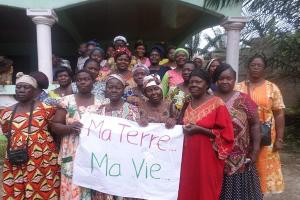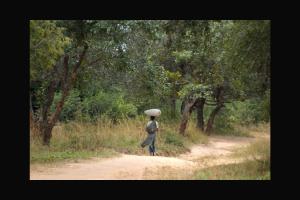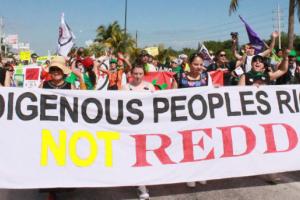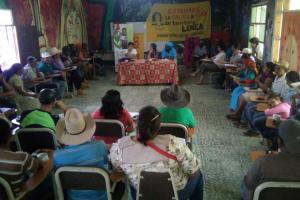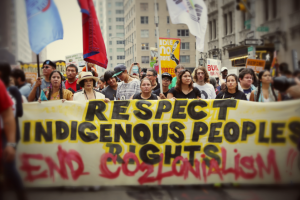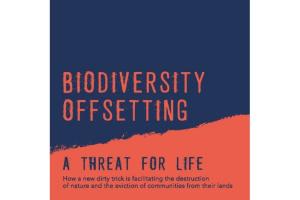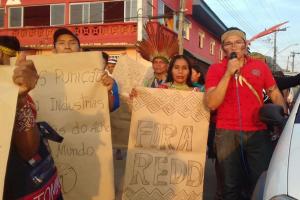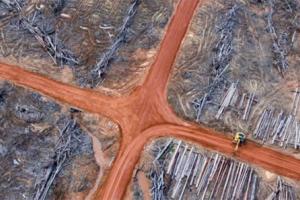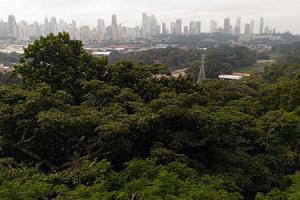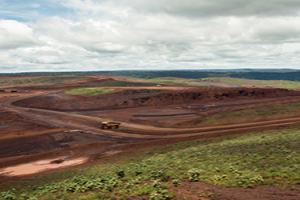Support African women! Sign the petition included on this article by filling the form enclosed below. Organized women who live around industrial oil palm plantations denounce different forms of violence.
The Green Economy
The Green Economy is a tactic used to “clean up” the image of corporations rather than address corporate capture and capitalism as the true drivers of deforestation. False solutions promoted under the Green Economy include certification, sustainable forest management, ecosystem services, REDD+, the bioeconomy, nature-based climate solutions, and zero net deforestation. Rather than stopping it, these “solutions” support corporate-driven destruction that is causing a deep social and ecological crisis.
Action alerts
17 January 2018
Bulletin articles
9 January 2018
Zambia’s peaceful context and strategic geographical location, combined with a desperate hunger for foreign direct investment, positions the country at the frontline of the global wave of resources grabbing, the crisis of global capital and the capitalisation of climate change
Bulletin articles
23 November 2017
The foundation of critical thinking, then, is in the dissent of the existing state of things and the search for alternatives, drawing from characterizations of the present situation, whose causes can obviously be located in the past” (1)
in memoriam Hector Alimonda
Bulletin articles
23 November 2017
Since ILO Convention 169 was ratified in 1995, indigenous peoples in Honduras have demanded the creation of a consultation mechanism to obtain Free, Prior Informed Consent (FPIC). This is in light of the avalanche of "development" projects and programs that endanger the survival of our peoples as differentiated cultures.
Bulletin articles
23 November 2017
Western colonialists and imperialists have for centuries pillaged and taken the lands, territories and natural resources of Indigenous Peoples (and the rest of the world) with impunity. This impunity extends to the pillage of people themselves through forced labor and slavery. Successor States as they gained independence continued the practice with the same impunity on Indigenous Peoples living within their borders.
Other information
23 November 2017
This new briefing, published by the NGOs Re:Common and Counter Balance, exposes the absurd logic behind biodiversity offsets and explains how it is deployed by private companies – with the support of governments and the legitimization of some conservation organizations and academics – to greenwash their reputation and continue with business-as-usual.
Access the briefing on English here.
Action alerts
6 November 2017
Available only in English and Spanish
Action alerts
3 October 2017
Indigenous Peoples from Acre in Brazil declare their rejection of REDD policies and their support for the work carried out by the Indigenous Missionary Council (CIMI). Feijó, State of Acre, Brazil, September 28th, 2017.
LETTER OF REJECTION AND REQUEST FOR CLARIFICATION
Action alerts
28 September 2017
REDD Early Movers – Jurisdictional REDD
Bulletin articles
21 September 2017
For over 20 year now, certification schemes such as the Forest Stewardship Council (FSC) and the Roundtable on Sustainable Palm Oil (RSPO) (1) have helped plantation companies secure their profits and protect their reputation. How do they do that, when the impacts of large-scale industrial eucalyptus, pine, acacia and oil palm plantations are so obvious for all to see?
Bulletin articles
23 August 2017
This issue of the WRM bulletin is focused on one of the key strategies that (mainly extractive) industries use to expand within the framework of the so-called "green economy": biodiversity offsets. We believe it is important to warn about the strong corporate push that is trying to get governments to relax their environmental laws, and thus allow certain industrial activities to take place in areas previously considered to be unviable.
